South Stream gas debacle seen as blow to Putin
- Published
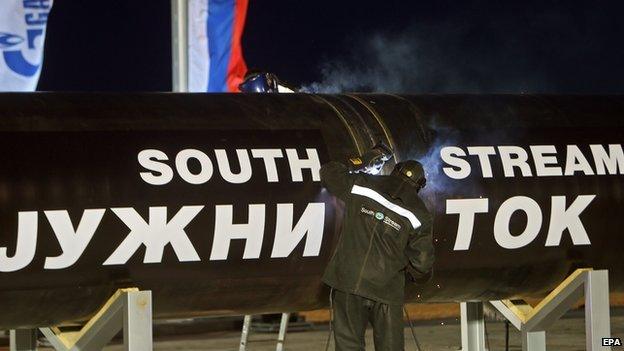
In Serbia work began on a pipeline section north of Belgrade a year ago
Russia's state-run media have accused the EU of thwarting the South Stream project for political reasons, commenting on President Vladimir Putin's announcement that the gas pipeline to Europe will not be built.
But in Bulgaria commentators were outraged that he blamed their country for the project's demise. And newspapers in Western Europe saw economic reasons behind the South Stream fiasco.
President Putin's announcement featured prominently on Russian TV. Popular state-controlled TV channels Rossiya 1, external and Channel 1, external branded it "sensational".
The reason behind the move is "the EU's non-constructive position", Channel 1 explained.
Bulgaria - an EU member since 2007 - stopped building the pipeline in June after pressure from the European Commission. South Stream was designed to pump gas all the way to Central Europe.
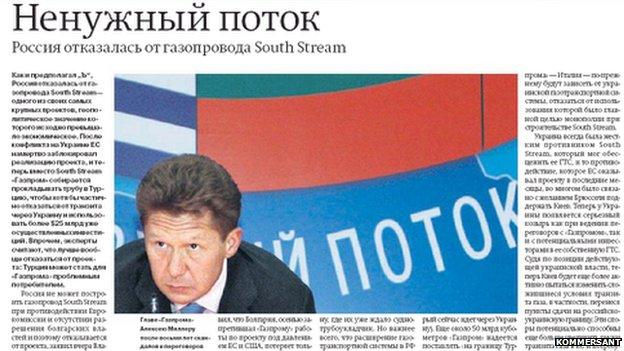
Russian newspaper Kommersant dubs the project "the Unnecessary Stream"
Echoing President Putin's remarks, Rossiya 24, external said Bulgaria's behaviour looked like "mockery". The Kremlin had been "patient" long enough before halting the project, the state-run TV said.
The Russian government's official newspaper, Rossiyskaya Gazeta, external, also blamed the EU. "Political tensions between Russia and the EU over the Ukrainian crisis led to the loss of hope of reaching compromise," it said.
Kommersant, external, a privately-run influential Russian daily, agreed that politics always overshadowed the South Stream project. It is therefore no surprise that the EU decided to "stop it dead in its tracks" amid the Ukraine crisis, the paper concluded.
'Down the drain'
But some social media commentators blamed the Kremlin. "Putin managed to make South Stream fail by turning the EU - which used to be mega-friendly towards us - against himself," blogger Oleg Kozyrev wrote, external.
"So that's 5bn dollars down the drain," said economist and former Russian deputy prime minister Alfred Kokh, external, referring to the construction costs so far for the frozen project.
"A project to pocket money" was how Slava Rabinovich, external, an opposition-minded financier, described South Stream. According to him, the money invested in the pipeline should have been spent on improving infrastructure in Russia, where, the blogger went on, many towns and villages are still stuck "in the Middle Ages".
Even though South Stream was meant to avoid Ukraine as a gas transit country, the project's demise will not necessarily benefit Kiev, said Mikhail Korchemkin, external, a blogger and energy industry analyst. In fact, he argued, President Putin's policy towards Ukraine may become even more aggressive. "Previously, Putin's actions in Ukraine were restrained by considerations about South Stream, but now this restraining factor has been removed," Mr Korchemkin wrote. "There aren't any positives for Ukraine in this," he added.
Bulgaria's 'losses'
In Bulgaria, politicians and analysts are angry at President Putin over South Stream. Some warned that scrapping the project would cost the Bulgarian economy millions of dollars in lost revenue.
Former energy minister Roumen Ovcharov put the figure at $600m (£384m) per annum - $200m more than the sum mentioned by Mr Putin. "Those are not just financial losses, but also geostrategic and political ones," Mr Ovcharov, a politician from the pro-Russian Socialist party, told Nova TV, external.
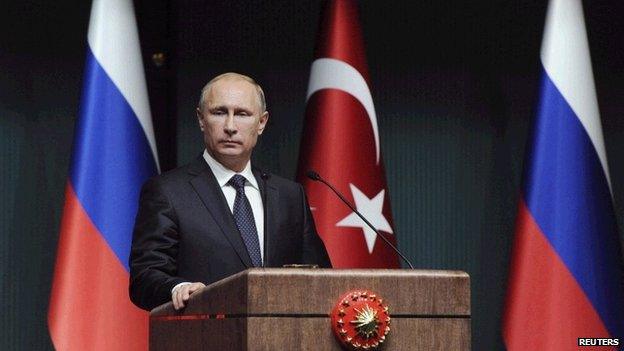
President Putin blamed the EU for the collapse of the South Stream project
However, speaking on the same programme, political analyst Ognian Mintchev, external quipped that the only thing Bulgaria had lost during the last couple of years was "political stability" because of "pressure from projects such as South Stream". "The good news is that EU laws have been respected," he added.
Influential Bulgarian blogger Ivo Indzhev, external was critical of both Russia and the government in Bulgaria. "What Putin told us is something our cowardly rulers do not dare say: South Stream failed following the tacit refusal of Bulgaria, a country that has no confidence to grab the historic chance and declare aloud its solidarity with pro-European and brotherly Ukraine".
'Personal defeat'
In Germany, Frankfurter Allgemeine Zeitung, external called the decision to drop South Stream "a personal defeat for Putin". The reason for it is the fact "the EU did not like the idea that Gazprom was to be the supplier and operator of the pipeline system," the paper argued.
Another German newspaper, Sueddeutsche Zeitung, external, saw possible economic reasons for Moscow dropping the project. "Most recently, doubts had been raised over whether the route to Europe would still be profitable for Gazprom in the face of falling gas prices," it said.
Similarly, Italy's La Repubblica, external argued that Moscow's decision was linked to the turmoil on the global energy markets or, as the paper called it, "the great energy earthquake".
"The latest jolt sweeps away South Stream. The maxi-pipeline - dear to Vladimir Putin, supported by the former Berlusconi government, opposed by the United States - will not be built," La Repubblica said.
BBC Monitoring reports and analyses news from TV, radio, web and print media around the world. You can follow BBC Monitoring on Twitter, external and Facebook, external.
- Published1 December 2014
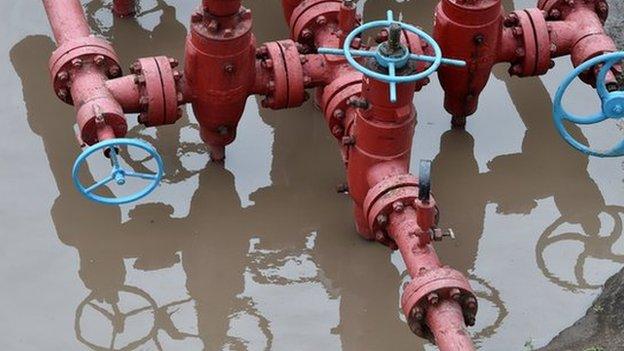
- Published27 November 2014
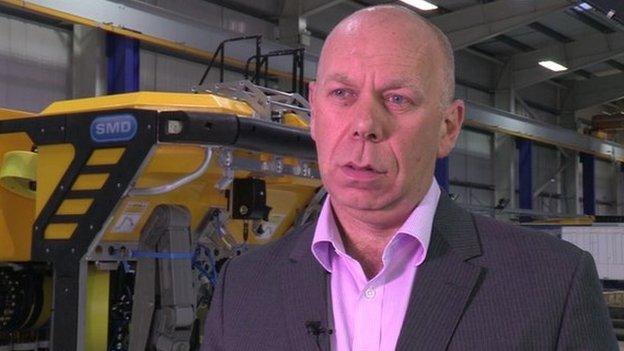
- Published27 November 2014
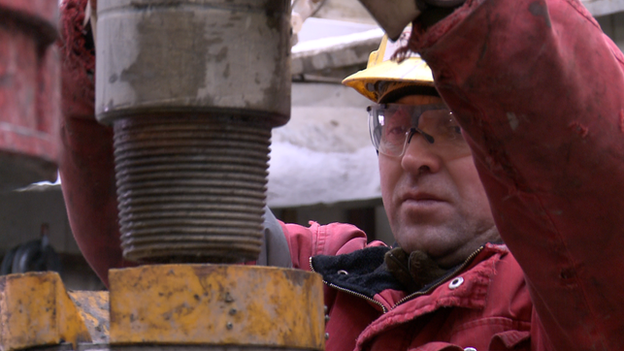
- Published25 March 2024
